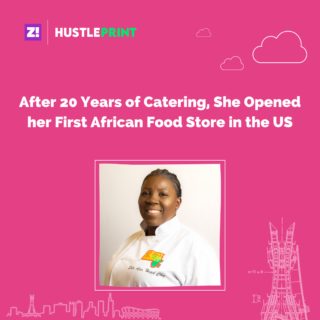
Navigating life as a woman in the world today is interesting. From Nigeria to Timbuktu, it’ll amaze you how similar all our experiences are. Every Wednesday, women the world over will share their experiences on everything from sex to politics right here.
Today’s subject for #ZikokoWhatSheSaid is Daniella Gaza, a 25-year-old Rwandese woman. She talks about her mischievous adventures in Kigali, the influence of her parents’ lives as refugees to chase a career in human justice, an unexpected turn after COVID, and a guide to a fun girls’ night out.
Tell me about growing up in Rwanda.
My father served in the Rwandan army, so my family lived in a military barracks in Kigali. For most of my childhood, his job took him away on long missions. I understood his absence was for our country, but I missed him.
While my father’s job took him away, my mother was also occupied with work. The fun part of Kigali was typically my younger siblings. I had two sisters and a brother — each born a year apart. We connected seamlessly because we were almost the same age. I’d say we were best friends, and it was exciting. For my mother, on the other hand, It was messy.
What do you mean by “messy?”
The mischievous misadventures of having four kids who were almost the same age. I’d imagine it was overwhelming for my parents. On one of those adventures, my siblings and I were bored. Since the neighbours were moving out, we decided to go to their empty house and play. It was easy to sneak away because the maids were distracted. We got in and found a sofa that looked abandoned. Apparently, it wasn’t. Our neighbour came back to find us jumping around in a fort we made from the cushions. He wasn’t mad about it, but that evening, my mother got the gist when she came back from work.
LOL. What did she do?
She yelled at us, but that was as far as she’d ever go. My parents were pretty relaxed — Rwandans are chill. There was never a time they’d beat us for our shenanigans. They didn’t know half of it, but I’m sure it wouldn’t have changed anything.
When I was 16, we started having arguments about going out. Kigali had a lit night scene, and I wanted to experience it. One night I didn’t get my parent’s approval, I snuck out for a birthday party. When I got back in, they were waiting for me in my room.
Ah…
Nothing happened. They just wanted to talk through it. There was a lot more freedom after that. So, a bit of rebellion went a long way.
Nigerian parents must not see this chat.
LOL. My parents never shied away from being vulnerable. Our hardest conversations were about their experiences as refugees in 1959 and the genocide of the Tutsis when they returned in 1994. Days without food to nights hiding in bushes — we talked about everything.
“Last last, you’ll always come back to Kigali” was the premise of their recap; a conveyance of hope for the future. It stuck with me, unconsciously. Moving to Canada for uni made me even more aware of the unsaid responsibility to represent my country and experience new cultures.
What was different about moving to Canada?
Nigerians. I met Nigerians. They were so loud about their culture — I loved it. Unlike Rwandans, they were cutthroat and direct. I remember getting into a conversation with two Nigerian girls. I was feeling their braids, and I walked up to let them know I loved it. They said they braided it themselves and I was lost. My mother never braided my or my sister’s hair, talk less of braiding it ourselves. If it wasn’t happening at the salon, then it wasn’t happening at all.
Then the cooking part. When I told them I was learning to cook, the exclamations were hilarious. I got plenty “Ah, by the time I was 10, I was already cooking…” Then they’d list dishes like ogbonno and their cherished jollof rice. In Rwanda, we didn’t have many special meals. There was fufu eaten with isombe (cassava leaves) and some beans, but that wasn’t something we ate often. Cooking wasn’t something we had to learn. Once we learnt to fry an omelet or cook mashed potatoes and a salad, we’re good.
My Nigerian friends showed me to braid my hair and of course, cook jollof rice. I’ll be honest, when I tasted Nigerian food, I knew Rwandans were missing out on something.
What’s that?
Flavour! LOL. I loved the samosa and mandazis (puff puffs) my mother makes on very special occasions, but when I went back to Kigali for holidays, I had to introduce my family to spicy food.
And?
They didn’t enjoy the peppery taste of stew or jollof rice.
LOL.
I met other Africans who grew up in Canada didn’t seem to care much about their cultures, then East Africans like the Burundians with cultures similar to Rwandans. But the Nigerians? From indomie to jollof and Wizkid, it was lit. Their flair for their culture made me just as proud to be a Rwandan in Canada. The intense cooking wasn’t for me though.
LOL. How did the rest of uni go?
I studied human justice and focused on women’s rights. It was something I always wanted to explore. My father’s dedication was an inspiration, but I really fell in love with the idea of justice in Grade 7. True-crime documentaries were my kryptonite and Les Enquêtes impossibles was my favourite show. On the weekends, I spent the whole day waiting for it to come up on TV and binged. Seeing the witty ways lawyers represented their clients riled me up; they seemed invincible.
When I became a teenager, it was How to get away with murder that stole my heart. I wanted to be Annalise Keating; the woman in heels, red lipstick and a black briefcase walking into court. When it was time to choose, human justice was close enough to the dream.
Why women’s rights?
I wanted it for two reasons. First, women were key players in rebuilding Rwanda after the genocide in1994. 60% of the seats in parliament were held by us, and I wanted to be a part of those numbers. Second, I was a budding feminist that loved her country. Once upon a time, Rwandese women weren’t allowed to go to school. Our policies changed in 1994, but for many African countries, it’s stayed the same. I was hoping my degree would allow me to join the race for gender equality in Africa — the dream of every feminist.
I love it. How did that go?
The plan was to move back to Kigali to practice in a human rights firm, but the pandemic had other plans.
What happened?
There weren’t a lot of opportunities because of the lockdown. Initially, it felt like a nice vacation after uni. There were parties and one or two beers at the pub almost every night. I was having a damn good time and burning a hole in my pocket.
Tourism presented itself as an opportunity when a friend’s aunt wanted to expand her firm to Rwanda. At first, I wasn’t keen on it. I was worried about the big goals I had in human rights, but there weren’t a lot of options. My parents also encouraged me to try it, so I took up the job. It’s been one of the best decisions.
And the dream to become Annalise Keating?
I’m on a different path, but I’m still driven by the same passion to push Rwanda forward. From our mountain gorillas to the volcanic landscapes, we’re monetising the beauty of my country for revenue. Everything syncs to the future. If it changes, I can always circle back to human justice. Right now, the Annalise Keating dream is evolving.
Nice. I’m curious: did moving back to Kigali as an adult feel different?
Kigali had always been a small town, but moving back, it felt smaller. Everyone knew everyone. There were hangouts every night after work. I was either at the pub for a beer or a friend’s house gisting over a glass of wine. But enjoyment in Rwanda can leave you broke. I needed to find balance. Right now, if I need some downtime, I have a glass of wine and watch a true-crime documentary.
LOL. What’s a girls’ night out in Kigali like?
I never know what we’re celebrating, but Rwandans are always up for a drink. So we’d definitely go to a club or a pub. We’d eat brochettes and dance all night. While we’re hungover the next morning, I’d take you to see mountain gorillas at the volcano park. More beer after that.
I need to tell my boss to consider Rwanda for our new office…
Please bring jollof rice.
LOL. What’s your next plan?
My big girl dream is to take a trip around Africa and explore the food. I’ve ticked Tanzania off my list, maybe Nigeria will be next. Right now, I’m saving up for a new apartment. I stay with my parents and it’s great, but I need my own space. Some of my aunties think that kind of move will scare men, but the right person will find me.
Can’t relate. We’re on the streets here—
LOL.
Nigerian women gave you jollof. What’s something you want to give us?
French music. I want Nigerian women to experience the serenity of it. I’d say, start with Tayc. Play Le Temps to serenade the love of your life this week or yourself!




